Detailed Report on Managing Accommodation Services at Marriott Hotels
VerifiedAdded on 2023/01/13
|18
|6508
|64
Report
AI Summary
This report provides a comprehensive overview of managing accommodation services within the hospitality industry, using Marriott International as a case study. It delves into various aspects, including the scale and types of accommodation services, different ownership models (franchised, leased, and managed), and the impact of grading, classification systems, and online reviews on potential guests. The report further explores the functions of the front office, its roles within Marriott, key roles within the housekeeping department, the importance of forecasting linen and supplies, and the interrelationships between housekeeping and other departments. Additionally, it highlights the significance of scheduling maintenance and repair work to minimize disruptions and the importance of security within the organization. The report covers various topics like grading, classification systems, and online review sites, ownership types, front office operations, housekeeping, and security protocols within Marriott International.
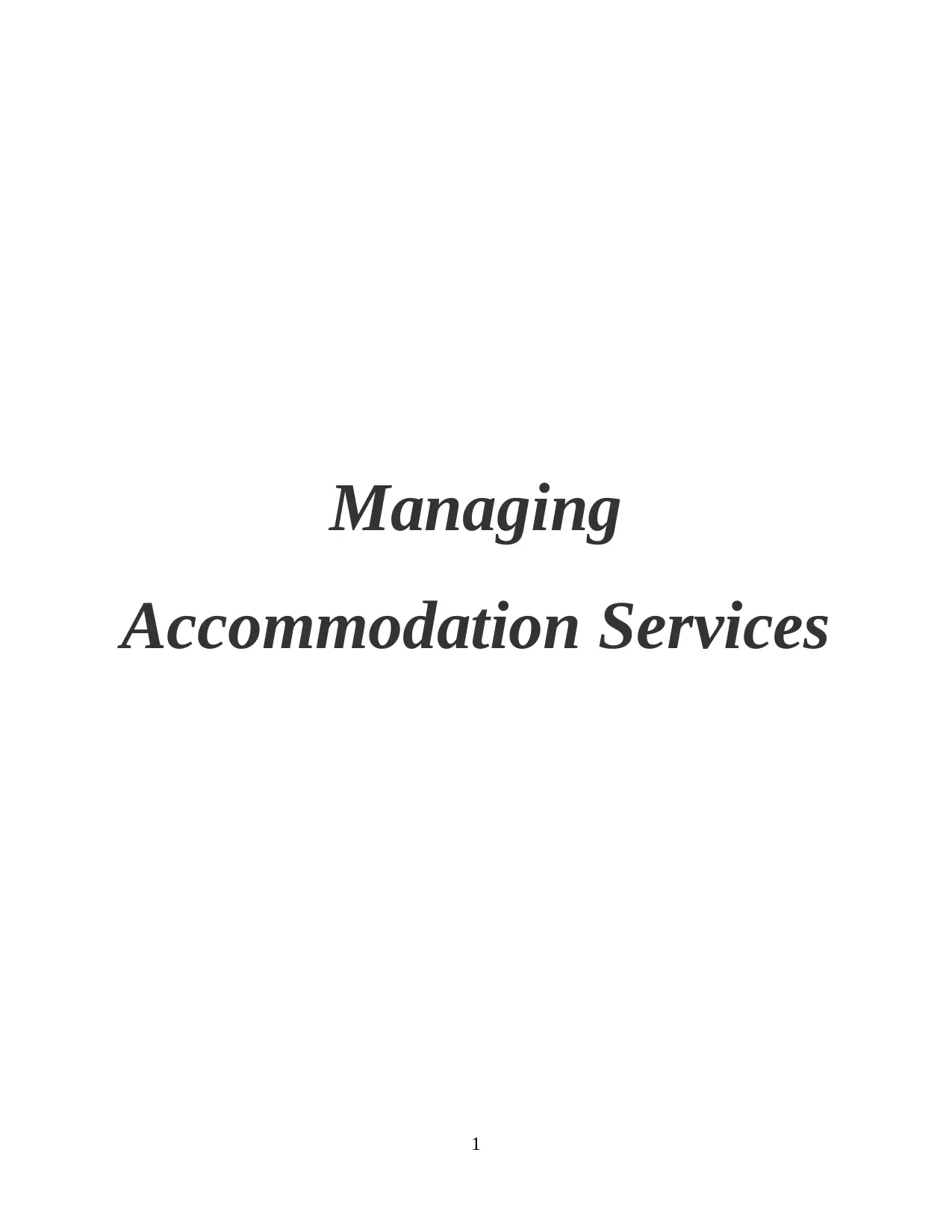
Managing
Accommodation Services
1
Accommodation Services
1
Paraphrase This Document
Need a fresh take? Get an instant paraphrase of this document with our AI Paraphraser
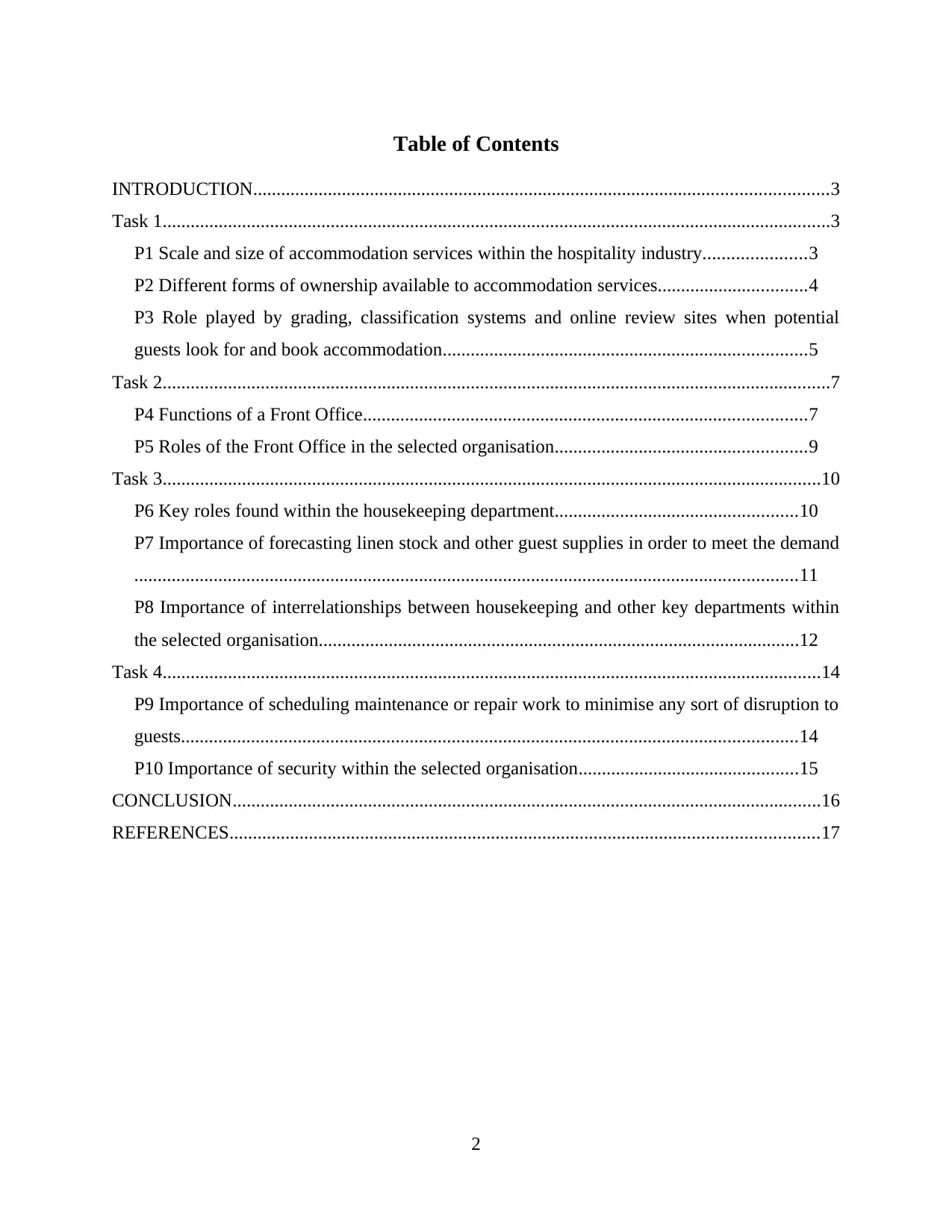
Table of Contents
INTRODUCTION...........................................................................................................................3
Task 1...............................................................................................................................................3
P1 Scale and size of accommodation services within the hospitality industry......................3
P2 Different forms of ownership available to accommodation services................................4
P3 Role played by grading, classification systems and online review sites when potential
guests look for and book accommodation..............................................................................5
Task 2...............................................................................................................................................7
P4 Functions of a Front Office...............................................................................................7
P5 Roles of the Front Office in the selected organisation......................................................9
Task 3.............................................................................................................................................10
P6 Key roles found within the housekeeping department....................................................10
P7 Importance of forecasting linen stock and other guest supplies in order to meet the demand
..............................................................................................................................................11
P8 Importance of interrelationships between housekeeping and other key departments within
the selected organisation.......................................................................................................12
Task 4.............................................................................................................................................14
P9 Importance of scheduling maintenance or repair work to minimise any sort of disruption to
guests....................................................................................................................................14
P10 Importance of security within the selected organisation...............................................15
CONCLUSION..............................................................................................................................16
REFERENCES..............................................................................................................................17
2
INTRODUCTION...........................................................................................................................3
Task 1...............................................................................................................................................3
P1 Scale and size of accommodation services within the hospitality industry......................3
P2 Different forms of ownership available to accommodation services................................4
P3 Role played by grading, classification systems and online review sites when potential
guests look for and book accommodation..............................................................................5
Task 2...............................................................................................................................................7
P4 Functions of a Front Office...............................................................................................7
P5 Roles of the Front Office in the selected organisation......................................................9
Task 3.............................................................................................................................................10
P6 Key roles found within the housekeeping department....................................................10
P7 Importance of forecasting linen stock and other guest supplies in order to meet the demand
..............................................................................................................................................11
P8 Importance of interrelationships between housekeeping and other key departments within
the selected organisation.......................................................................................................12
Task 4.............................................................................................................................................14
P9 Importance of scheduling maintenance or repair work to minimise any sort of disruption to
guests....................................................................................................................................14
P10 Importance of security within the selected organisation...............................................15
CONCLUSION..............................................................................................................................16
REFERENCES..............................................................................................................................17
2
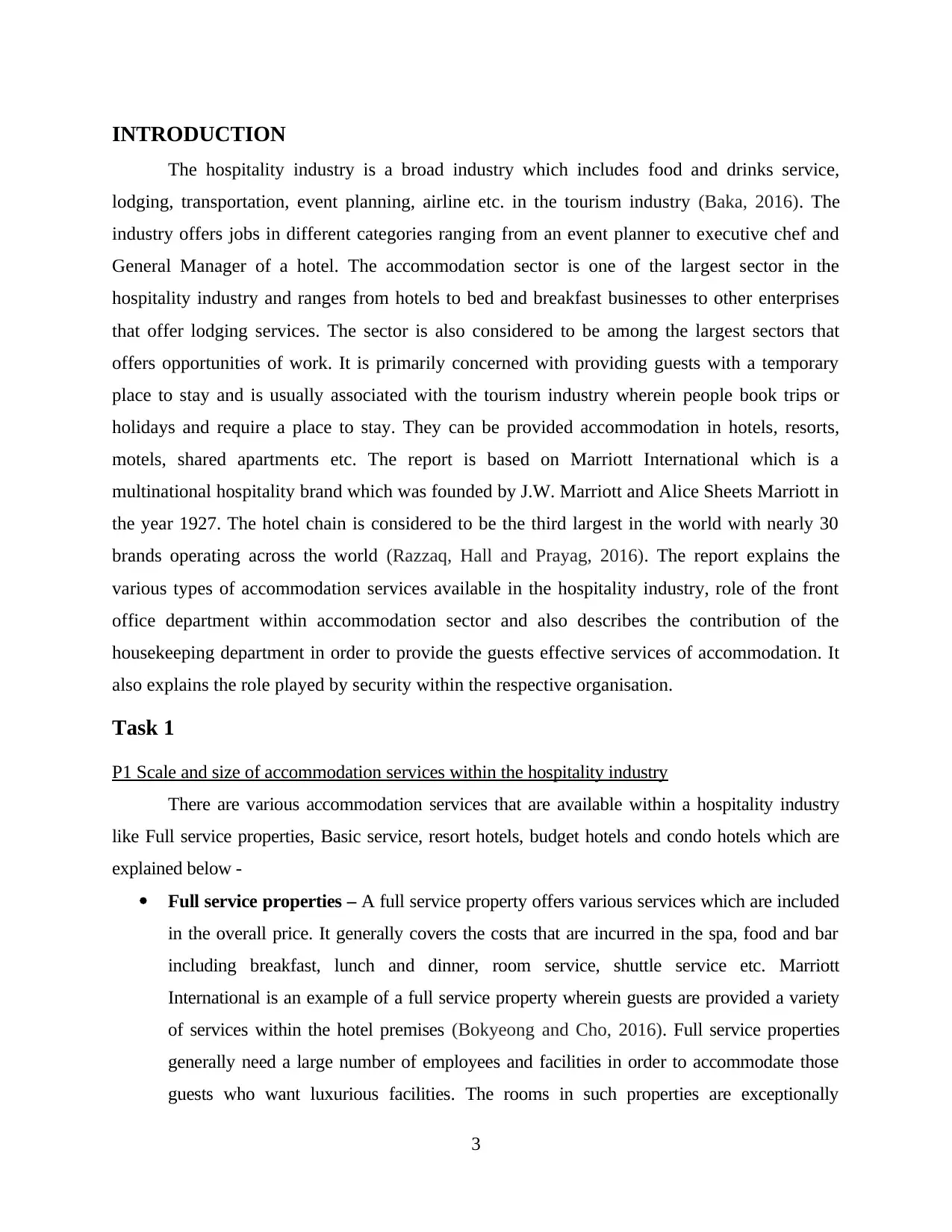
INTRODUCTION
The hospitality industry is a broad industry which includes food and drinks service,
lodging, transportation, event planning, airline etc. in the tourism industry (Baka, 2016). The
industry offers jobs in different categories ranging from an event planner to executive chef and
General Manager of a hotel. The accommodation sector is one of the largest sector in the
hospitality industry and ranges from hotels to bed and breakfast businesses to other enterprises
that offer lodging services. The sector is also considered to be among the largest sectors that
offers opportunities of work. It is primarily concerned with providing guests with a temporary
place to stay and is usually associated with the tourism industry wherein people book trips or
holidays and require a place to stay. They can be provided accommodation in hotels, resorts,
motels, shared apartments etc. The report is based on Marriott International which is a
multinational hospitality brand which was founded by J.W. Marriott and Alice Sheets Marriott in
the year 1927. The hotel chain is considered to be the third largest in the world with nearly 30
brands operating across the world (Razzaq, Hall and Prayag, 2016). The report explains the
various types of accommodation services available in the hospitality industry, role of the front
office department within accommodation sector and also describes the contribution of the
housekeeping department in order to provide the guests effective services of accommodation. It
also explains the role played by security within the respective organisation.
Task 1
P1 Scale and size of accommodation services within the hospitality industry
There are various accommodation services that are available within a hospitality industry
like Full service properties, Basic service, resort hotels, budget hotels and condo hotels which are
explained below -
Full service properties – A full service property offers various services which are included
in the overall price. It generally covers the costs that are incurred in the spa, food and bar
including breakfast, lunch and dinner, room service, shuttle service etc. Marriott
International is an example of a full service property wherein guests are provided a variety
of services within the hotel premises (Bokyeong and Cho, 2016). Full service properties
generally need a large number of employees and facilities in order to accommodate those
guests who want luxurious facilities. The rooms in such properties are exceptionally
3
The hospitality industry is a broad industry which includes food and drinks service,
lodging, transportation, event planning, airline etc. in the tourism industry (Baka, 2016). The
industry offers jobs in different categories ranging from an event planner to executive chef and
General Manager of a hotel. The accommodation sector is one of the largest sector in the
hospitality industry and ranges from hotels to bed and breakfast businesses to other enterprises
that offer lodging services. The sector is also considered to be among the largest sectors that
offers opportunities of work. It is primarily concerned with providing guests with a temporary
place to stay and is usually associated with the tourism industry wherein people book trips or
holidays and require a place to stay. They can be provided accommodation in hotels, resorts,
motels, shared apartments etc. The report is based on Marriott International which is a
multinational hospitality brand which was founded by J.W. Marriott and Alice Sheets Marriott in
the year 1927. The hotel chain is considered to be the third largest in the world with nearly 30
brands operating across the world (Razzaq, Hall and Prayag, 2016). The report explains the
various types of accommodation services available in the hospitality industry, role of the front
office department within accommodation sector and also describes the contribution of the
housekeeping department in order to provide the guests effective services of accommodation. It
also explains the role played by security within the respective organisation.
Task 1
P1 Scale and size of accommodation services within the hospitality industry
There are various accommodation services that are available within a hospitality industry
like Full service properties, Basic service, resort hotels, budget hotels and condo hotels which are
explained below -
Full service properties – A full service property offers various services which are included
in the overall price. It generally covers the costs that are incurred in the spa, food and bar
including breakfast, lunch and dinner, room service, shuttle service etc. Marriott
International is an example of a full service property wherein guests are provided a variety
of services within the hotel premises (Bokyeong and Cho, 2016). Full service properties
generally need a large number of employees and facilities in order to accommodate those
guests who want luxurious facilities. The rooms in such properties are exceptionally
3
⊘ This is a preview!⊘
Do you want full access?
Subscribe today to unlock all pages.

Trusted by 1+ million students worldwide
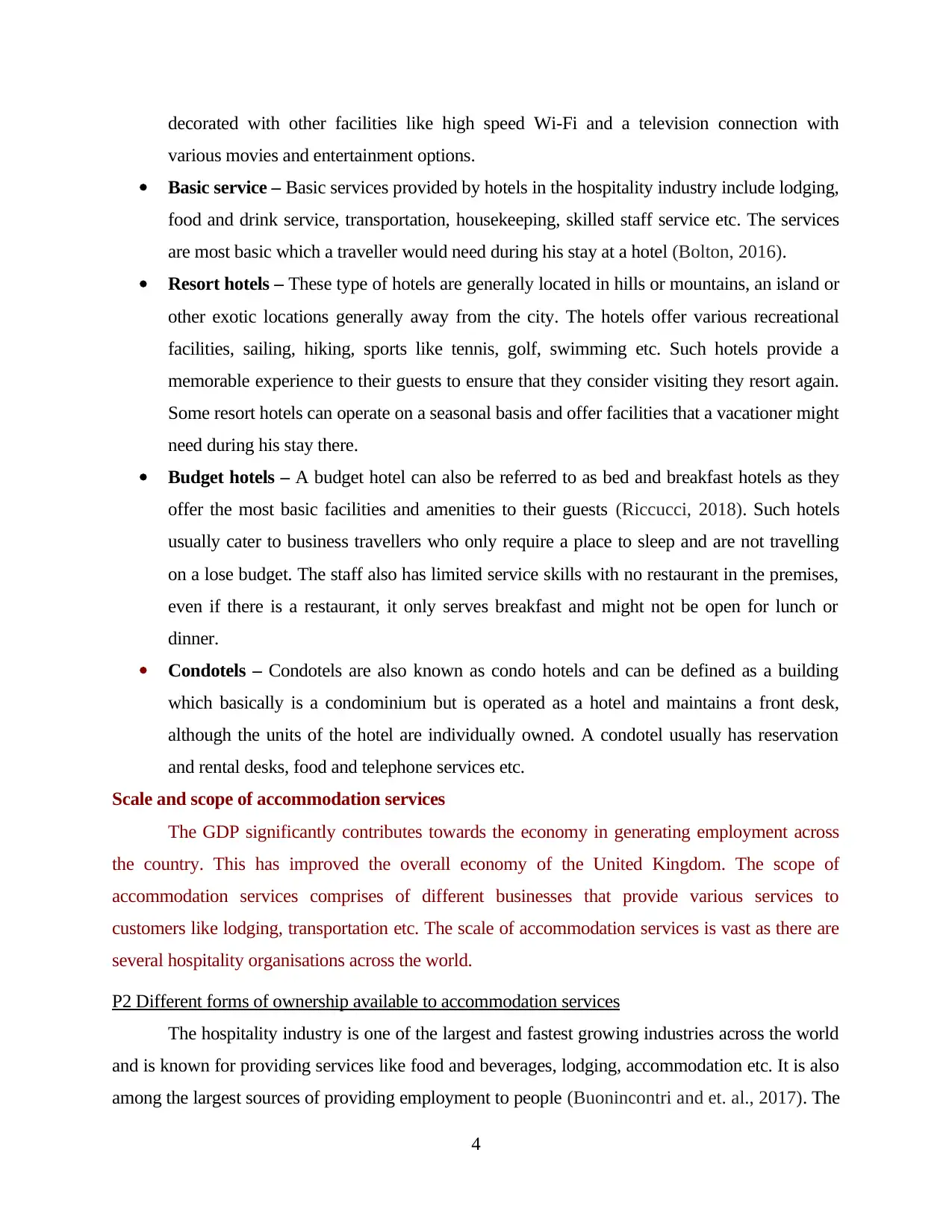
decorated with other facilities like high speed Wi-Fi and a television connection with
various movies and entertainment options.
Basic service – Basic services provided by hotels in the hospitality industry include lodging,
food and drink service, transportation, housekeeping, skilled staff service etc. The services
are most basic which a traveller would need during his stay at a hotel (Bolton, 2016).
Resort hotels – These type of hotels are generally located in hills or mountains, an island or
other exotic locations generally away from the city. The hotels offer various recreational
facilities, sailing, hiking, sports like tennis, golf, swimming etc. Such hotels provide a
memorable experience to their guests to ensure that they consider visiting they resort again.
Some resort hotels can operate on a seasonal basis and offer facilities that a vacationer might
need during his stay there.
Budget hotels – A budget hotel can also be referred to as bed and breakfast hotels as they
offer the most basic facilities and amenities to their guests (Riccucci, 2018). Such hotels
usually cater to business travellers who only require a place to sleep and are not travelling
on a lose budget. The staff also has limited service skills with no restaurant in the premises,
even if there is a restaurant, it only serves breakfast and might not be open for lunch or
dinner.
Condotels – Condotels are also known as condo hotels and can be defined as a building
which basically is a condominium but is operated as a hotel and maintains a front desk,
although the units of the hotel are individually owned. A condotel usually has reservation
and rental desks, food and telephone services etc.
Scale and scope of accommodation services
The GDP significantly contributes towards the economy in generating employment across
the country. This has improved the overall economy of the United Kingdom. The scope of
accommodation services comprises of different businesses that provide various services to
customers like lodging, transportation etc. The scale of accommodation services is vast as there are
several hospitality organisations across the world.
P2 Different forms of ownership available to accommodation services
The hospitality industry is one of the largest and fastest growing industries across the world
and is known for providing services like food and beverages, lodging, accommodation etc. It is also
among the largest sources of providing employment to people (Buonincontri and et. al., 2017). The
4
various movies and entertainment options.
Basic service – Basic services provided by hotels in the hospitality industry include lodging,
food and drink service, transportation, housekeeping, skilled staff service etc. The services
are most basic which a traveller would need during his stay at a hotel (Bolton, 2016).
Resort hotels – These type of hotels are generally located in hills or mountains, an island or
other exotic locations generally away from the city. The hotels offer various recreational
facilities, sailing, hiking, sports like tennis, golf, swimming etc. Such hotels provide a
memorable experience to their guests to ensure that they consider visiting they resort again.
Some resort hotels can operate on a seasonal basis and offer facilities that a vacationer might
need during his stay there.
Budget hotels – A budget hotel can also be referred to as bed and breakfast hotels as they
offer the most basic facilities and amenities to their guests (Riccucci, 2018). Such hotels
usually cater to business travellers who only require a place to sleep and are not travelling
on a lose budget. The staff also has limited service skills with no restaurant in the premises,
even if there is a restaurant, it only serves breakfast and might not be open for lunch or
dinner.
Condotels – Condotels are also known as condo hotels and can be defined as a building
which basically is a condominium but is operated as a hotel and maintains a front desk,
although the units of the hotel are individually owned. A condotel usually has reservation
and rental desks, food and telephone services etc.
Scale and scope of accommodation services
The GDP significantly contributes towards the economy in generating employment across
the country. This has improved the overall economy of the United Kingdom. The scope of
accommodation services comprises of different businesses that provide various services to
customers like lodging, transportation etc. The scale of accommodation services is vast as there are
several hospitality organisations across the world.
P2 Different forms of ownership available to accommodation services
The hospitality industry is one of the largest and fastest growing industries across the world
and is known for providing services like food and beverages, lodging, accommodation etc. It is also
among the largest sources of providing employment to people (Buonincontri and et. al., 2017). The
4
Paraphrase This Document
Need a fresh take? Get an instant paraphrase of this document with our AI Paraphraser
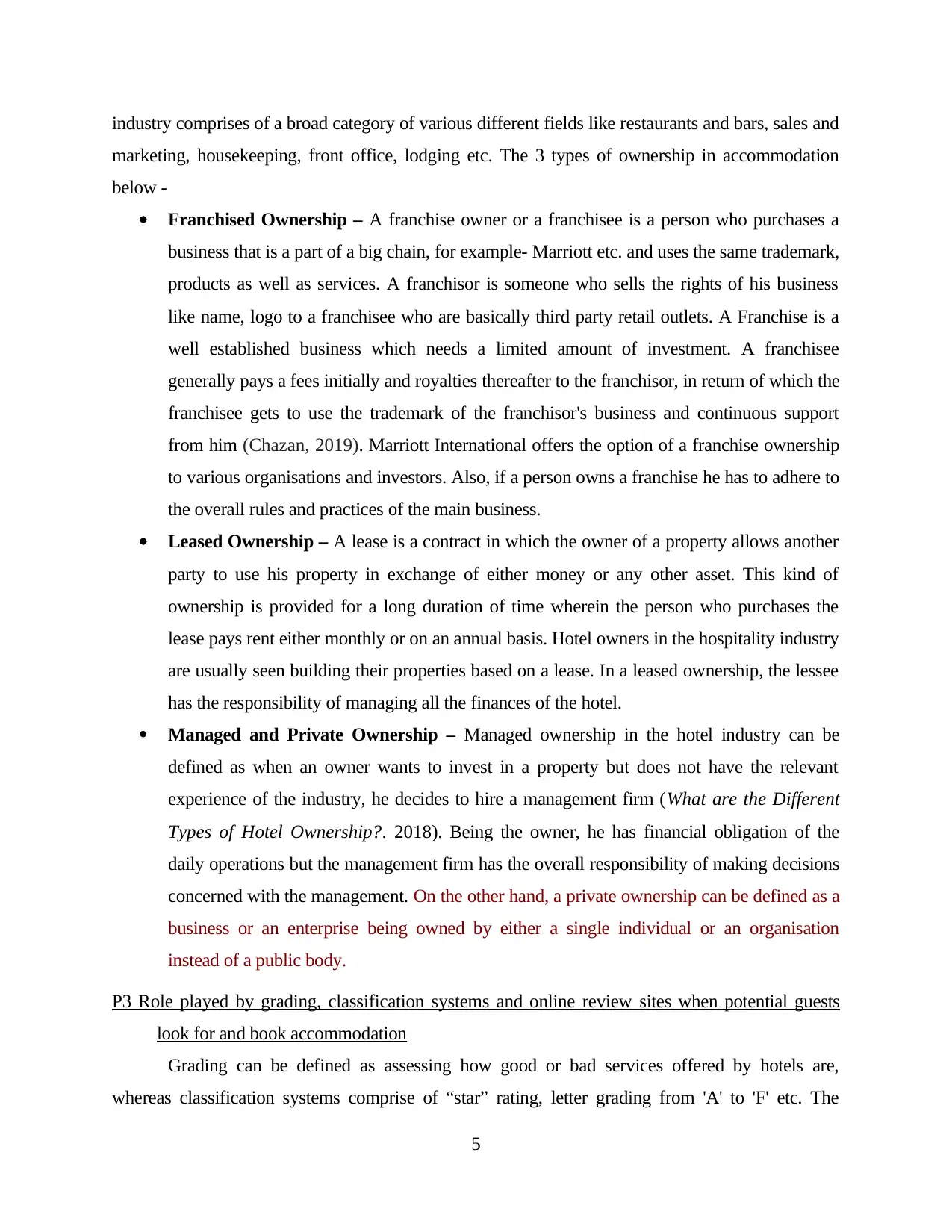
industry comprises of a broad category of various different fields like restaurants and bars, sales and
marketing, housekeeping, front office, lodging etc. The 3 types of ownership in accommodation
below -
Franchised Ownership – A franchise owner or a franchisee is a person who purchases a
business that is a part of a big chain, for example- Marriott etc. and uses the same trademark,
products as well as services. A franchisor is someone who sells the rights of his business
like name, logo to a franchisee who are basically third party retail outlets. A Franchise is a
well established business which needs a limited amount of investment. A franchisee
generally pays a fees initially and royalties thereafter to the franchisor, in return of which the
franchisee gets to use the trademark of the franchisor's business and continuous support
from him (Chazan, 2019). Marriott International offers the option of a franchise ownership
to various organisations and investors. Also, if a person owns a franchise he has to adhere to
the overall rules and practices of the main business.
Leased Ownership – A lease is a contract in which the owner of a property allows another
party to use his property in exchange of either money or any other asset. This kind of
ownership is provided for a long duration of time wherein the person who purchases the
lease pays rent either monthly or on an annual basis. Hotel owners in the hospitality industry
are usually seen building their properties based on a lease. In a leased ownership, the lessee
has the responsibility of managing all the finances of the hotel.
Managed and Private Ownership – Managed ownership in the hotel industry can be
defined as when an owner wants to invest in a property but does not have the relevant
experience of the industry, he decides to hire a management firm (What are the Different
Types of Hotel Ownership?. 2018). Being the owner, he has financial obligation of the
daily operations but the management firm has the overall responsibility of making decisions
concerned with the management. On the other hand, a private ownership can be defined as a
business or an enterprise being owned by either a single individual or an organisation
instead of a public body.
P3 Role played by grading, classification systems and online review sites when potential guests
look for and book accommodation
Grading can be defined as assessing how good or bad services offered by hotels are,
whereas classification systems comprise of “star” rating, letter grading from 'A' to 'F' etc. The
5
marketing, housekeeping, front office, lodging etc. The 3 types of ownership in accommodation
below -
Franchised Ownership – A franchise owner or a franchisee is a person who purchases a
business that is a part of a big chain, for example- Marriott etc. and uses the same trademark,
products as well as services. A franchisor is someone who sells the rights of his business
like name, logo to a franchisee who are basically third party retail outlets. A Franchise is a
well established business which needs a limited amount of investment. A franchisee
generally pays a fees initially and royalties thereafter to the franchisor, in return of which the
franchisee gets to use the trademark of the franchisor's business and continuous support
from him (Chazan, 2019). Marriott International offers the option of a franchise ownership
to various organisations and investors. Also, if a person owns a franchise he has to adhere to
the overall rules and practices of the main business.
Leased Ownership – A lease is a contract in which the owner of a property allows another
party to use his property in exchange of either money or any other asset. This kind of
ownership is provided for a long duration of time wherein the person who purchases the
lease pays rent either monthly or on an annual basis. Hotel owners in the hospitality industry
are usually seen building their properties based on a lease. In a leased ownership, the lessee
has the responsibility of managing all the finances of the hotel.
Managed and Private Ownership – Managed ownership in the hotel industry can be
defined as when an owner wants to invest in a property but does not have the relevant
experience of the industry, he decides to hire a management firm (What are the Different
Types of Hotel Ownership?. 2018). Being the owner, he has financial obligation of the
daily operations but the management firm has the overall responsibility of making decisions
concerned with the management. On the other hand, a private ownership can be defined as a
business or an enterprise being owned by either a single individual or an organisation
instead of a public body.
P3 Role played by grading, classification systems and online review sites when potential guests
look for and book accommodation
Grading can be defined as assessing how good or bad services offered by hotels are,
whereas classification systems comprise of “star” rating, letter grading from 'A' to 'F' etc. The
5
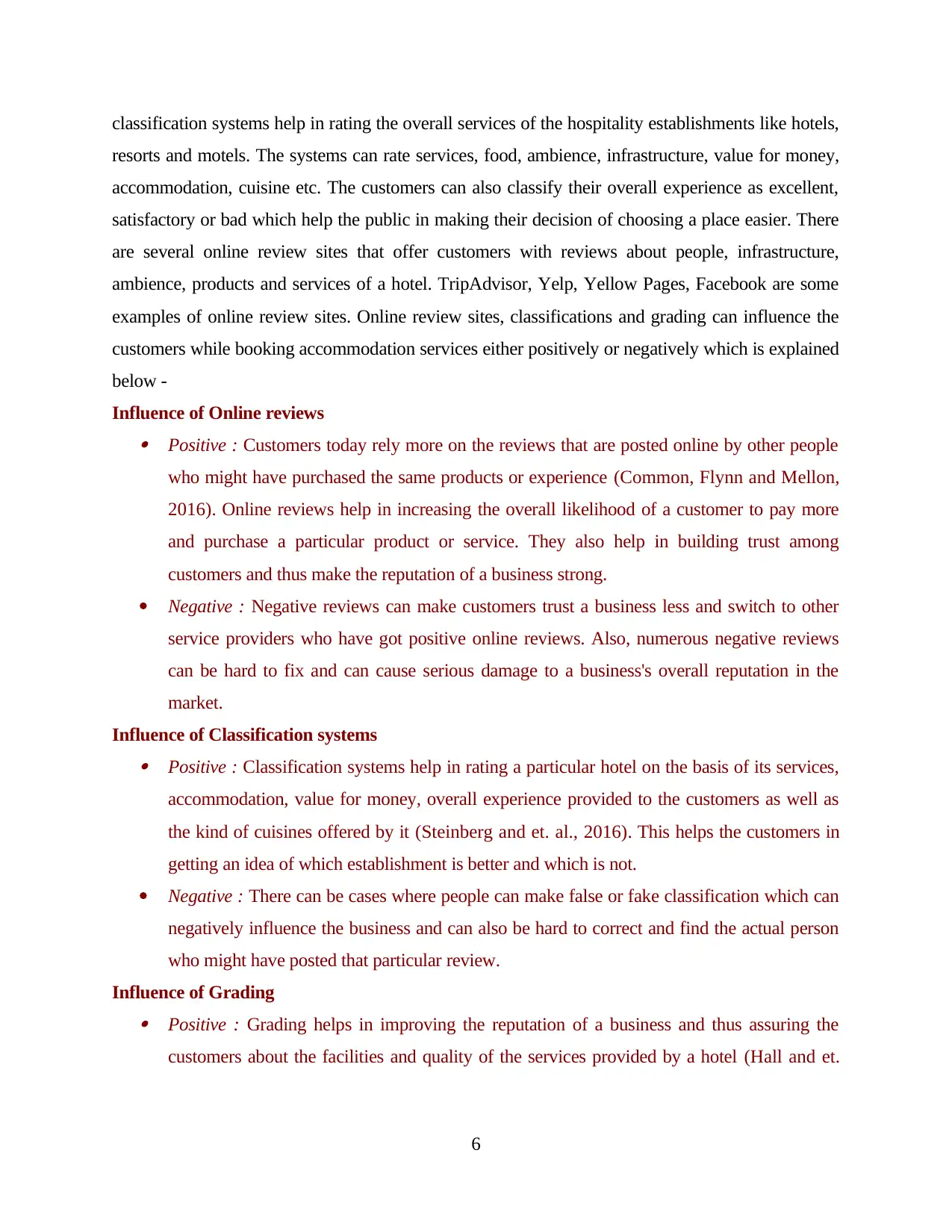
classification systems help in rating the overall services of the hospitality establishments like hotels,
resorts and motels. The systems can rate services, food, ambience, infrastructure, value for money,
accommodation, cuisine etc. The customers can also classify their overall experience as excellent,
satisfactory or bad which help the public in making their decision of choosing a place easier. There
are several online review sites that offer customers with reviews about people, infrastructure,
ambience, products and services of a hotel. TripAdvisor, Yelp, Yellow Pages, Facebook are some
examples of online review sites. Online review sites, classifications and grading can influence the
customers while booking accommodation services either positively or negatively which is explained
below -
Influence of Online reviews Positive : Customers today rely more on the reviews that are posted online by other people
who might have purchased the same products or experience (Common, Flynn and Mellon,
2016). Online reviews help in increasing the overall likelihood of a customer to pay more
and purchase a particular product or service. They also help in building trust among
customers and thus make the reputation of a business strong.
Negative : Negative reviews can make customers trust a business less and switch to other
service providers who have got positive online reviews. Also, numerous negative reviews
can be hard to fix and can cause serious damage to a business's overall reputation in the
market.
Influence of Classification systems Positive : Classification systems help in rating a particular hotel on the basis of its services,
accommodation, value for money, overall experience provided to the customers as well as
the kind of cuisines offered by it (Steinberg and et. al., 2016). This helps the customers in
getting an idea of which establishment is better and which is not.
Negative : There can be cases where people can make false or fake classification which can
negatively influence the business and can also be hard to correct and find the actual person
who might have posted that particular review.
Influence of Grading Positive : Grading helps in improving the reputation of a business and thus assuring the
customers about the facilities and quality of the services provided by a hotel (Hall and et.
6
resorts and motels. The systems can rate services, food, ambience, infrastructure, value for money,
accommodation, cuisine etc. The customers can also classify their overall experience as excellent,
satisfactory or bad which help the public in making their decision of choosing a place easier. There
are several online review sites that offer customers with reviews about people, infrastructure,
ambience, products and services of a hotel. TripAdvisor, Yelp, Yellow Pages, Facebook are some
examples of online review sites. Online review sites, classifications and grading can influence the
customers while booking accommodation services either positively or negatively which is explained
below -
Influence of Online reviews Positive : Customers today rely more on the reviews that are posted online by other people
who might have purchased the same products or experience (Common, Flynn and Mellon,
2016). Online reviews help in increasing the overall likelihood of a customer to pay more
and purchase a particular product or service. They also help in building trust among
customers and thus make the reputation of a business strong.
Negative : Negative reviews can make customers trust a business less and switch to other
service providers who have got positive online reviews. Also, numerous negative reviews
can be hard to fix and can cause serious damage to a business's overall reputation in the
market.
Influence of Classification systems Positive : Classification systems help in rating a particular hotel on the basis of its services,
accommodation, value for money, overall experience provided to the customers as well as
the kind of cuisines offered by it (Steinberg and et. al., 2016). This helps the customers in
getting an idea of which establishment is better and which is not.
Negative : There can be cases where people can make false or fake classification which can
negatively influence the business and can also be hard to correct and find the actual person
who might have posted that particular review.
Influence of Grading Positive : Grading helps in improving the reputation of a business and thus assuring the
customers about the facilities and quality of the services provided by a hotel (Hall and et.
6
⊘ This is a preview!⊘
Do you want full access?
Subscribe today to unlock all pages.

Trusted by 1+ million students worldwide
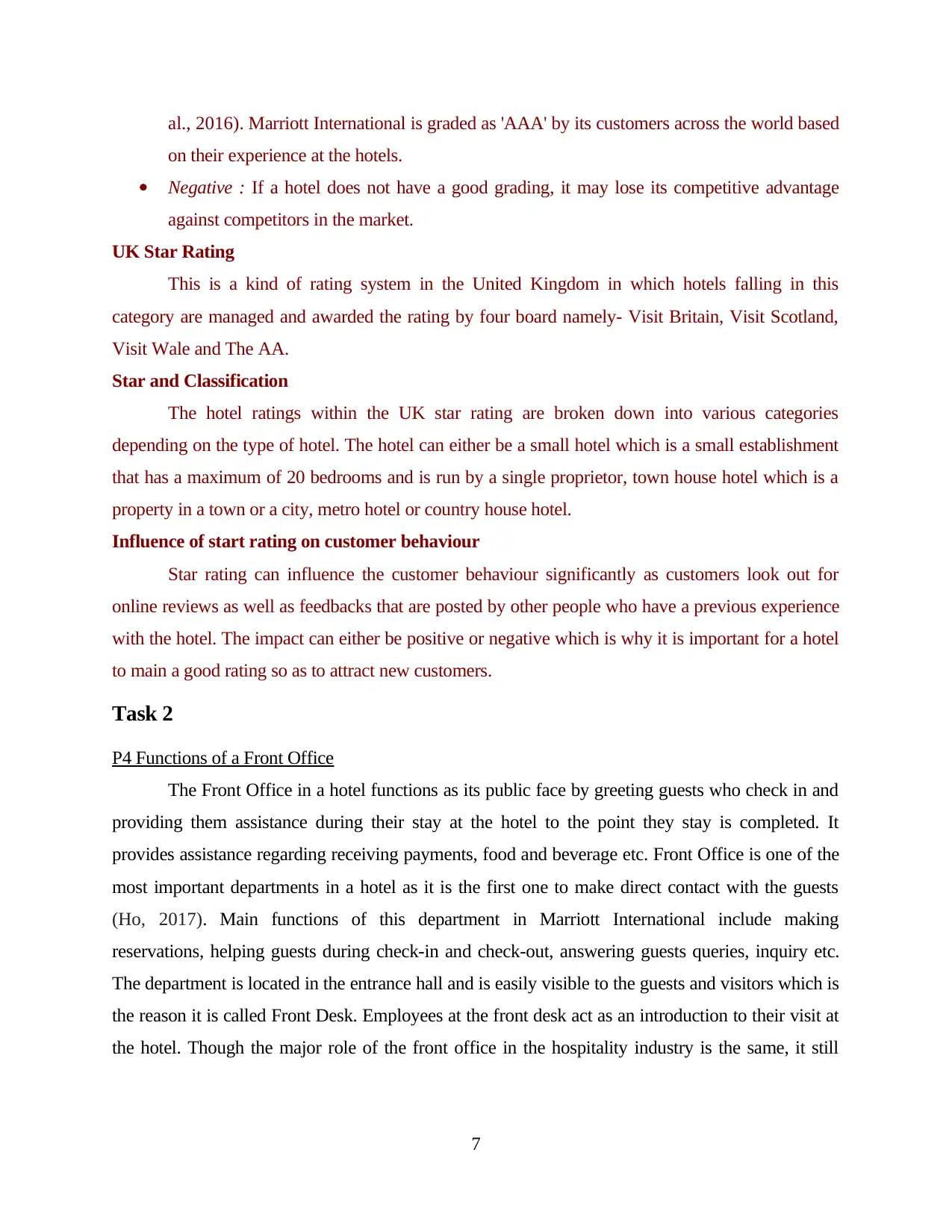
al., 2016). Marriott International is graded as 'AAA' by its customers across the world based
on their experience at the hotels.
Negative : If a hotel does not have a good grading, it may lose its competitive advantage
against competitors in the market.
UK Star Rating
This is a kind of rating system in the United Kingdom in which hotels falling in this
category are managed and awarded the rating by four board namely- Visit Britain, Visit Scotland,
Visit Wale and The AA.
Star and Classification
The hotel ratings within the UK star rating are broken down into various categories
depending on the type of hotel. The hotel can either be a small hotel which is a small establishment
that has a maximum of 20 bedrooms and is run by a single proprietor, town house hotel which is a
property in a town or a city, metro hotel or country house hotel.
Influence of start rating on customer behaviour
Star rating can influence the customer behaviour significantly as customers look out for
online reviews as well as feedbacks that are posted by other people who have a previous experience
with the hotel. The impact can either be positive or negative which is why it is important for a hotel
to main a good rating so as to attract new customers.
Task 2
P4 Functions of a Front Office
The Front Office in a hotel functions as its public face by greeting guests who check in and
providing them assistance during their stay at the hotel to the point they stay is completed. It
provides assistance regarding receiving payments, food and beverage etc. Front Office is one of the
most important departments in a hotel as it is the first one to make direct contact with the guests
(Ho, 2017). Main functions of this department in Marriott International include making
reservations, helping guests during check-in and check-out, answering guests queries, inquiry etc.
The department is located in the entrance hall and is easily visible to the guests and visitors which is
the reason it is called Front Desk. Employees at the front desk act as an introduction to their visit at
the hotel. Though the major role of the front office in the hospitality industry is the same, it still
7
on their experience at the hotels.
Negative : If a hotel does not have a good grading, it may lose its competitive advantage
against competitors in the market.
UK Star Rating
This is a kind of rating system in the United Kingdom in which hotels falling in this
category are managed and awarded the rating by four board namely- Visit Britain, Visit Scotland,
Visit Wale and The AA.
Star and Classification
The hotel ratings within the UK star rating are broken down into various categories
depending on the type of hotel. The hotel can either be a small hotel which is a small establishment
that has a maximum of 20 bedrooms and is run by a single proprietor, town house hotel which is a
property in a town or a city, metro hotel or country house hotel.
Influence of start rating on customer behaviour
Star rating can influence the customer behaviour significantly as customers look out for
online reviews as well as feedbacks that are posted by other people who have a previous experience
with the hotel. The impact can either be positive or negative which is why it is important for a hotel
to main a good rating so as to attract new customers.
Task 2
P4 Functions of a Front Office
The Front Office in a hotel functions as its public face by greeting guests who check in and
providing them assistance during their stay at the hotel to the point they stay is completed. It
provides assistance regarding receiving payments, food and beverage etc. Front Office is one of the
most important departments in a hotel as it is the first one to make direct contact with the guests
(Ho, 2017). Main functions of this department in Marriott International include making
reservations, helping guests during check-in and check-out, answering guests queries, inquiry etc.
The department is located in the entrance hall and is easily visible to the guests and visitors which is
the reason it is called Front Desk. Employees at the front desk act as an introduction to their visit at
the hotel. Though the major role of the front office in the hospitality industry is the same, it still
7
Paraphrase This Document
Need a fresh take? Get an instant paraphrase of this document with our AI Paraphraser
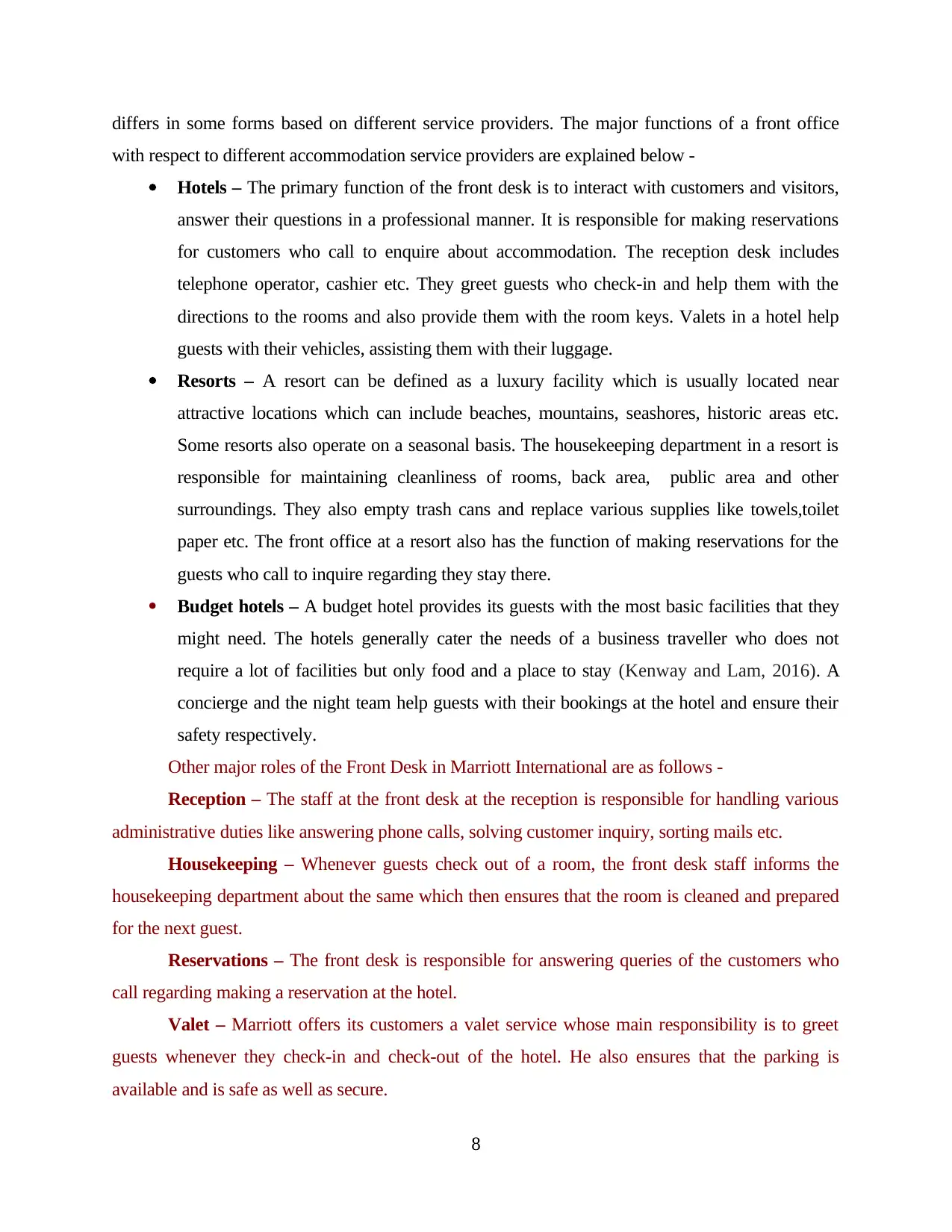
differs in some forms based on different service providers. The major functions of a front office
with respect to different accommodation service providers are explained below -
Hotels – The primary function of the front desk is to interact with customers and visitors,
answer their questions in a professional manner. It is responsible for making reservations
for customers who call to enquire about accommodation. The reception desk includes
telephone operator, cashier etc. They greet guests who check-in and help them with the
directions to the rooms and also provide them with the room keys. Valets in a hotel help
guests with their vehicles, assisting them with their luggage.
Resorts – A resort can be defined as a luxury facility which is usually located near
attractive locations which can include beaches, mountains, seashores, historic areas etc.
Some resorts also operate on a seasonal basis. The housekeeping department in a resort is
responsible for maintaining cleanliness of rooms, back area, public area and other
surroundings. They also empty trash cans and replace various supplies like towels,toilet
paper etc. The front office at a resort also has the function of making reservations for the
guests who call to inquire regarding they stay there.
Budget hotels – A budget hotel provides its guests with the most basic facilities that they
might need. The hotels generally cater the needs of a business traveller who does not
require a lot of facilities but only food and a place to stay (Kenway and Lam, 2016). A
concierge and the night team help guests with their bookings at the hotel and ensure their
safety respectively.
Other major roles of the Front Desk in Marriott International are as follows -
Reception – The staff at the front desk at the reception is responsible for handling various
administrative duties like answering phone calls, solving customer inquiry, sorting mails etc.
Housekeeping – Whenever guests check out of a room, the front desk staff informs the
housekeeping department about the same which then ensures that the room is cleaned and prepared
for the next guest.
Reservations – The front desk is responsible for answering queries of the customers who
call regarding making a reservation at the hotel.
Valet – Marriott offers its customers a valet service whose main responsibility is to greet
guests whenever they check-in and check-out of the hotel. He also ensures that the parking is
available and is safe as well as secure.
8
with respect to different accommodation service providers are explained below -
Hotels – The primary function of the front desk is to interact with customers and visitors,
answer their questions in a professional manner. It is responsible for making reservations
for customers who call to enquire about accommodation. The reception desk includes
telephone operator, cashier etc. They greet guests who check-in and help them with the
directions to the rooms and also provide them with the room keys. Valets in a hotel help
guests with their vehicles, assisting them with their luggage.
Resorts – A resort can be defined as a luxury facility which is usually located near
attractive locations which can include beaches, mountains, seashores, historic areas etc.
Some resorts also operate on a seasonal basis. The housekeeping department in a resort is
responsible for maintaining cleanliness of rooms, back area, public area and other
surroundings. They also empty trash cans and replace various supplies like towels,toilet
paper etc. The front office at a resort also has the function of making reservations for the
guests who call to inquire regarding they stay there.
Budget hotels – A budget hotel provides its guests with the most basic facilities that they
might need. The hotels generally cater the needs of a business traveller who does not
require a lot of facilities but only food and a place to stay (Kenway and Lam, 2016). A
concierge and the night team help guests with their bookings at the hotel and ensure their
safety respectively.
Other major roles of the Front Desk in Marriott International are as follows -
Reception – The staff at the front desk at the reception is responsible for handling various
administrative duties like answering phone calls, solving customer inquiry, sorting mails etc.
Housekeeping – Whenever guests check out of a room, the front desk staff informs the
housekeeping department about the same which then ensures that the room is cleaned and prepared
for the next guest.
Reservations – The front desk is responsible for answering queries of the customers who
call regarding making a reservation at the hotel.
Valet – Marriott offers its customers a valet service whose main responsibility is to greet
guests whenever they check-in and check-out of the hotel. He also ensures that the parking is
available and is safe as well as secure.
8
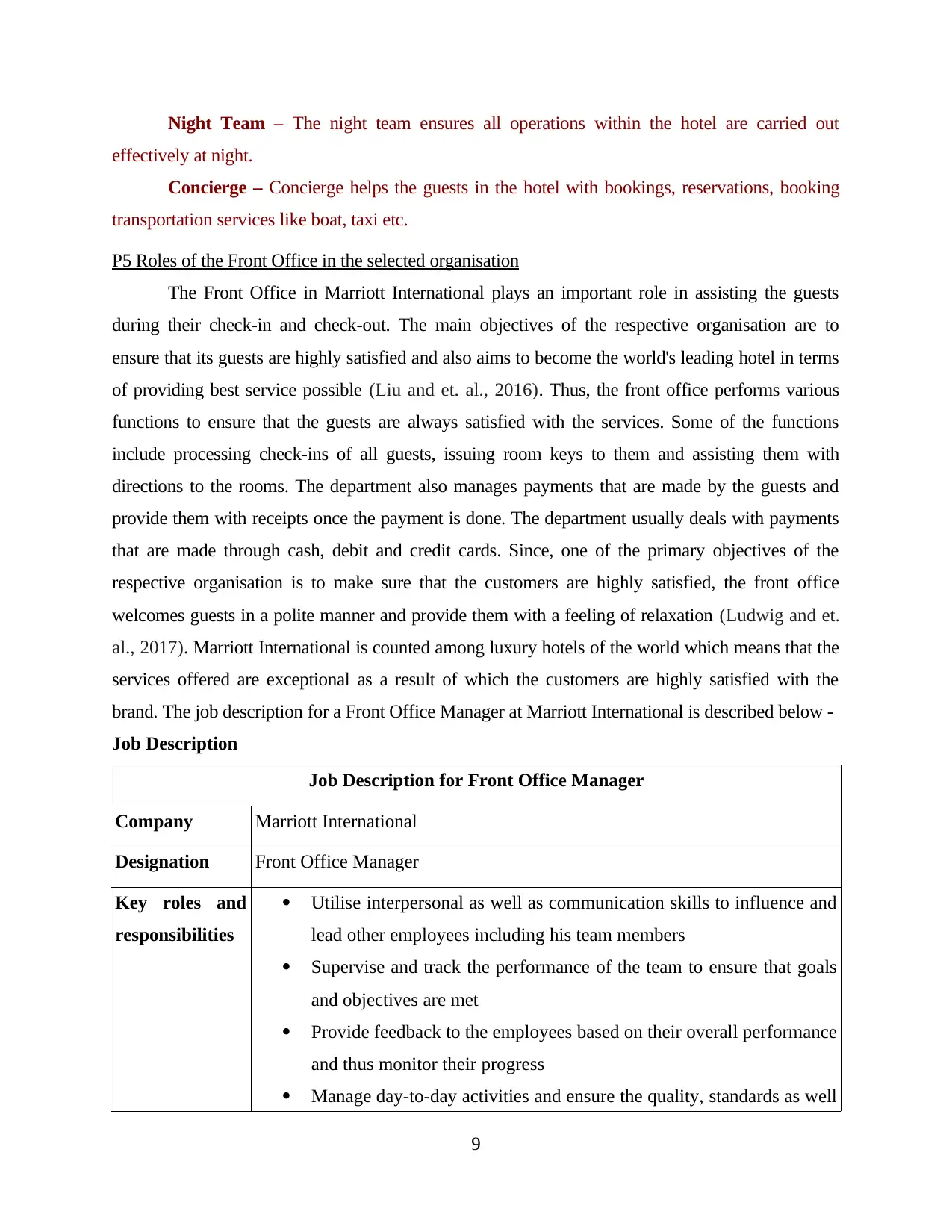
Night Team – The night team ensures all operations within the hotel are carried out
effectively at night.
Concierge – Concierge helps the guests in the hotel with bookings, reservations, booking
transportation services like boat, taxi etc.
P5 Roles of the Front Office in the selected organisation
The Front Office in Marriott International plays an important role in assisting the guests
during their check-in and check-out. The main objectives of the respective organisation are to
ensure that its guests are highly satisfied and also aims to become the world's leading hotel in terms
of providing best service possible (Liu and et. al., 2016). Thus, the front office performs various
functions to ensure that the guests are always satisfied with the services. Some of the functions
include processing check-ins of all guests, issuing room keys to them and assisting them with
directions to the rooms. The department also manages payments that are made by the guests and
provide them with receipts once the payment is done. The department usually deals with payments
that are made through cash, debit and credit cards. Since, one of the primary objectives of the
respective organisation is to make sure that the customers are highly satisfied, the front office
welcomes guests in a polite manner and provide them with a feeling of relaxation (Ludwig and et.
al., 2017). Marriott International is counted among luxury hotels of the world which means that the
services offered are exceptional as a result of which the customers are highly satisfied with the
brand. The job description for a Front Office Manager at Marriott International is described below -
Job Description
Job Description for Front Office Manager
Company Marriott International
Designation Front Office Manager
Key roles and
responsibilities
Utilise interpersonal as well as communication skills to influence and
lead other employees including his team members
Supervise and track the performance of the team to ensure that goals
and objectives are met
Provide feedback to the employees based on their overall performance
and thus monitor their progress
Manage day-to-day activities and ensure the quality, standards as well
9
effectively at night.
Concierge – Concierge helps the guests in the hotel with bookings, reservations, booking
transportation services like boat, taxi etc.
P5 Roles of the Front Office in the selected organisation
The Front Office in Marriott International plays an important role in assisting the guests
during their check-in and check-out. The main objectives of the respective organisation are to
ensure that its guests are highly satisfied and also aims to become the world's leading hotel in terms
of providing best service possible (Liu and et. al., 2016). Thus, the front office performs various
functions to ensure that the guests are always satisfied with the services. Some of the functions
include processing check-ins of all guests, issuing room keys to them and assisting them with
directions to the rooms. The department also manages payments that are made by the guests and
provide them with receipts once the payment is done. The department usually deals with payments
that are made through cash, debit and credit cards. Since, one of the primary objectives of the
respective organisation is to make sure that the customers are highly satisfied, the front office
welcomes guests in a polite manner and provide them with a feeling of relaxation (Ludwig and et.
al., 2017). Marriott International is counted among luxury hotels of the world which means that the
services offered are exceptional as a result of which the customers are highly satisfied with the
brand. The job description for a Front Office Manager at Marriott International is described below -
Job Description
Job Description for Front Office Manager
Company Marriott International
Designation Front Office Manager
Key roles and
responsibilities
Utilise interpersonal as well as communication skills to influence and
lead other employees including his team members
Supervise and track the performance of the team to ensure that goals
and objectives are met
Provide feedback to the employees based on their overall performance
and thus monitor their progress
Manage day-to-day activities and ensure the quality, standards as well
9
⊘ This is a preview!⊘
Do you want full access?
Subscribe today to unlock all pages.

Trusted by 1+ million students worldwide
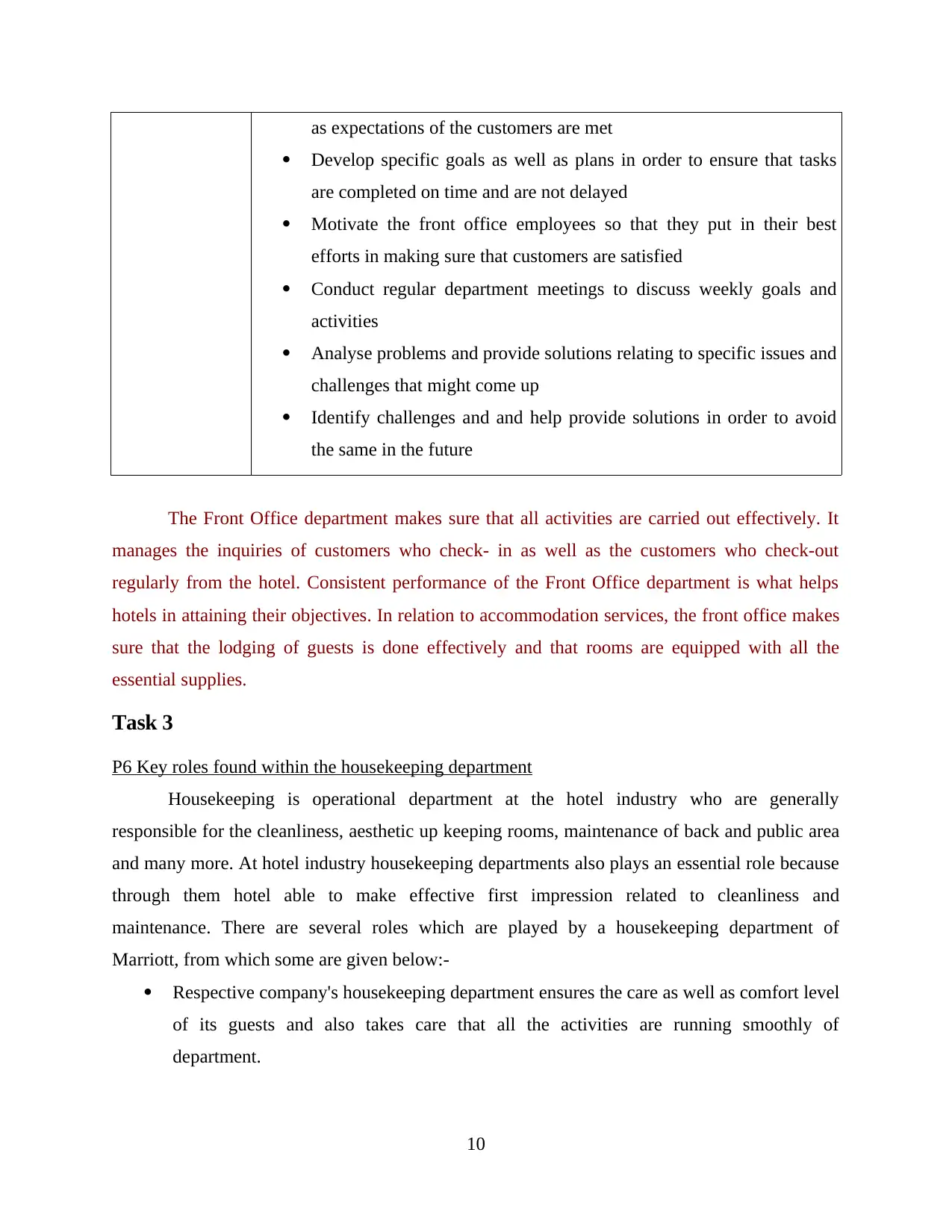
as expectations of the customers are met
Develop specific goals as well as plans in order to ensure that tasks
are completed on time and are not delayed
Motivate the front office employees so that they put in their best
efforts in making sure that customers are satisfied
Conduct regular department meetings to discuss weekly goals and
activities
Analyse problems and provide solutions relating to specific issues and
challenges that might come up
Identify challenges and and help provide solutions in order to avoid
the same in the future
The Front Office department makes sure that all activities are carried out effectively. It
manages the inquiries of customers who check- in as well as the customers who check-out
regularly from the hotel. Consistent performance of the Front Office department is what helps
hotels in attaining their objectives. In relation to accommodation services, the front office makes
sure that the lodging of guests is done effectively and that rooms are equipped with all the
essential supplies.
Task 3
P6 Key roles found within the housekeeping department
Housekeeping is operational department at the hotel industry who are generally
responsible for the cleanliness, aesthetic up keeping rooms, maintenance of back and public area
and many more. At hotel industry housekeeping departments also plays an essential role because
through them hotel able to make effective first impression related to cleanliness and
maintenance. There are several roles which are played by a housekeeping department of
Marriott, from which some are given below:-
Respective company's housekeeping department ensures the care as well as comfort level
of its guests and also takes care that all the activities are running smoothly of
department.
10
Develop specific goals as well as plans in order to ensure that tasks
are completed on time and are not delayed
Motivate the front office employees so that they put in their best
efforts in making sure that customers are satisfied
Conduct regular department meetings to discuss weekly goals and
activities
Analyse problems and provide solutions relating to specific issues and
challenges that might come up
Identify challenges and and help provide solutions in order to avoid
the same in the future
The Front Office department makes sure that all activities are carried out effectively. It
manages the inquiries of customers who check- in as well as the customers who check-out
regularly from the hotel. Consistent performance of the Front Office department is what helps
hotels in attaining their objectives. In relation to accommodation services, the front office makes
sure that the lodging of guests is done effectively and that rooms are equipped with all the
essential supplies.
Task 3
P6 Key roles found within the housekeeping department
Housekeeping is operational department at the hotel industry who are generally
responsible for the cleanliness, aesthetic up keeping rooms, maintenance of back and public area
and many more. At hotel industry housekeeping departments also plays an essential role because
through them hotel able to make effective first impression related to cleanliness and
maintenance. There are several roles which are played by a housekeeping department of
Marriott, from which some are given below:-
Respective company's housekeeping department ensures the care as well as comfort level
of its guests and also takes care that all the activities are running smoothly of
department.
10
Paraphrase This Document
Need a fresh take? Get an instant paraphrase of this document with our AI Paraphraser
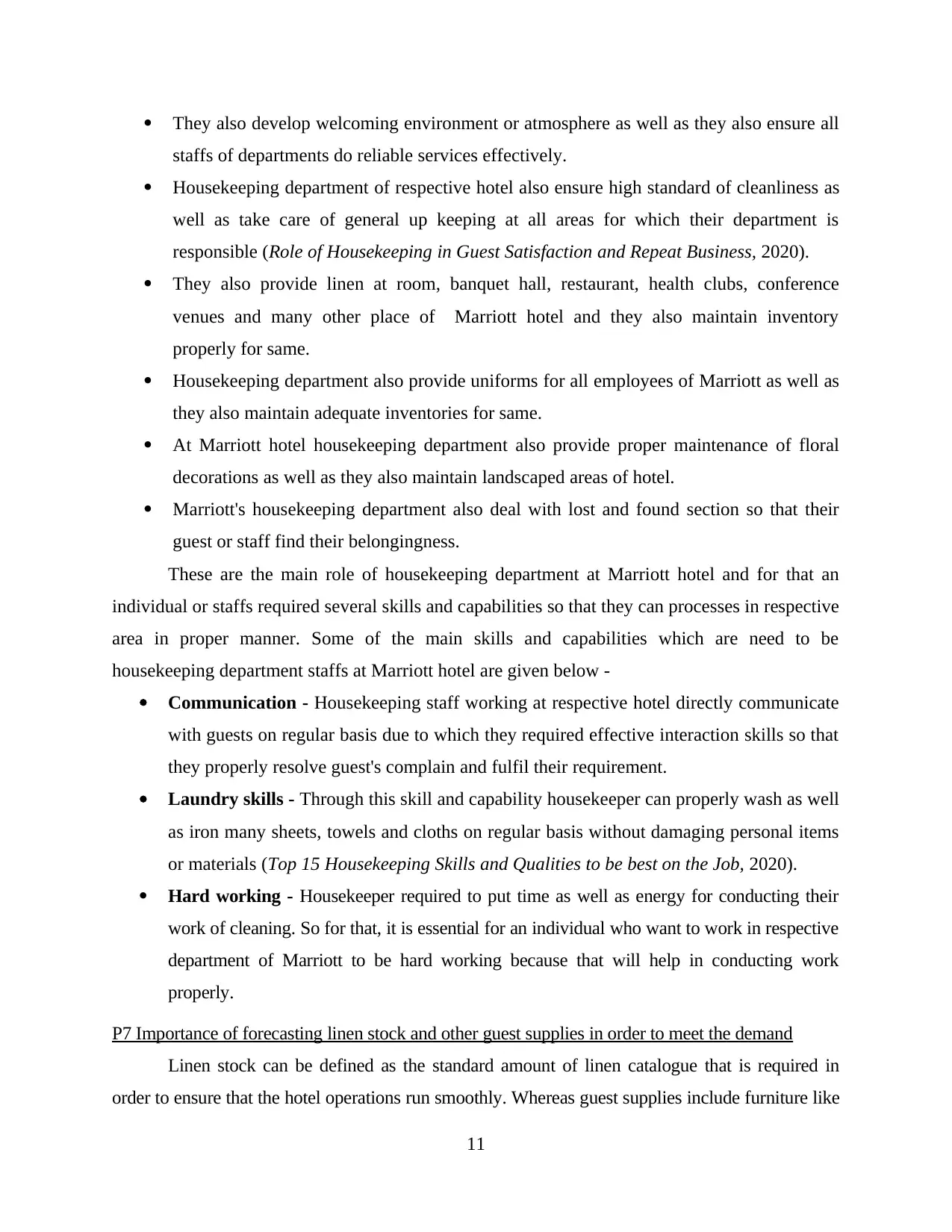
They also develop welcoming environment or atmosphere as well as they also ensure all
staffs of departments do reliable services effectively.
Housekeeping department of respective hotel also ensure high standard of cleanliness as
well as take care of general up keeping at all areas for which their department is
responsible (Role of Housekeeping in Guest Satisfaction and Repeat Business, 2020).
They also provide linen at room, banquet hall, restaurant, health clubs, conference
venues and many other place of Marriott hotel and they also maintain inventory
properly for same.
Housekeeping department also provide uniforms for all employees of Marriott as well as
they also maintain adequate inventories for same.
At Marriott hotel housekeeping department also provide proper maintenance of floral
decorations as well as they also maintain landscaped areas of hotel.
Marriott's housekeeping department also deal with lost and found section so that their
guest or staff find their belongingness.
These are the main role of housekeeping department at Marriott hotel and for that an
individual or staffs required several skills and capabilities so that they can processes in respective
area in proper manner. Some of the main skills and capabilities which are need to be
housekeeping department staffs at Marriott hotel are given below -
Communication - Housekeeping staff working at respective hotel directly communicate
with guests on regular basis due to which they required effective interaction skills so that
they properly resolve guest's complain and fulfil their requirement.
Laundry skills - Through this skill and capability housekeeper can properly wash as well
as iron many sheets, towels and cloths on regular basis without damaging personal items
or materials (Top 15 Housekeeping Skills and Qualities to be best on the Job, 2020).
Hard working - Housekeeper required to put time as well as energy for conducting their
work of cleaning. So for that, it is essential for an individual who want to work in respective
department of Marriott to be hard working because that will help in conducting work
properly.
P7 Importance of forecasting linen stock and other guest supplies in order to meet the demand
Linen stock can be defined as the standard amount of linen catalogue that is required in
order to ensure that the hotel operations run smoothly. Whereas guest supplies include furniture like
11
staffs of departments do reliable services effectively.
Housekeeping department of respective hotel also ensure high standard of cleanliness as
well as take care of general up keeping at all areas for which their department is
responsible (Role of Housekeeping in Guest Satisfaction and Repeat Business, 2020).
They also provide linen at room, banquet hall, restaurant, health clubs, conference
venues and many other place of Marriott hotel and they also maintain inventory
properly for same.
Housekeeping department also provide uniforms for all employees of Marriott as well as
they also maintain adequate inventories for same.
At Marriott hotel housekeeping department also provide proper maintenance of floral
decorations as well as they also maintain landscaped areas of hotel.
Marriott's housekeeping department also deal with lost and found section so that their
guest or staff find their belongingness.
These are the main role of housekeeping department at Marriott hotel and for that an
individual or staffs required several skills and capabilities so that they can processes in respective
area in proper manner. Some of the main skills and capabilities which are need to be
housekeeping department staffs at Marriott hotel are given below -
Communication - Housekeeping staff working at respective hotel directly communicate
with guests on regular basis due to which they required effective interaction skills so that
they properly resolve guest's complain and fulfil their requirement.
Laundry skills - Through this skill and capability housekeeper can properly wash as well
as iron many sheets, towels and cloths on regular basis without damaging personal items
or materials (Top 15 Housekeeping Skills and Qualities to be best on the Job, 2020).
Hard working - Housekeeper required to put time as well as energy for conducting their
work of cleaning. So for that, it is essential for an individual who want to work in respective
department of Marriott to be hard working because that will help in conducting work
properly.
P7 Importance of forecasting linen stock and other guest supplies in order to meet the demand
Linen stock can be defined as the standard amount of linen catalogue that is required in
order to ensure that the hotel operations run smoothly. Whereas guest supplies include furniture like
11
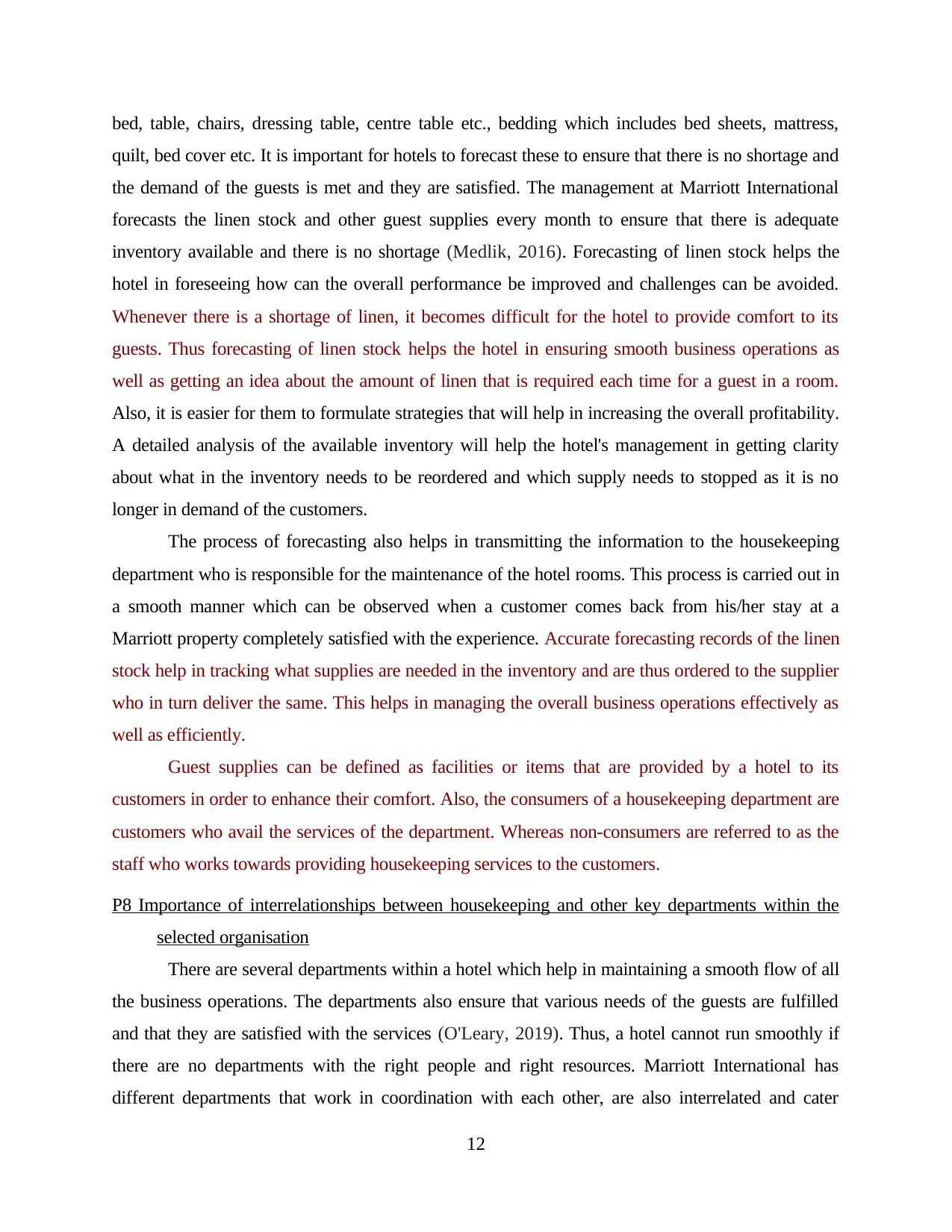
bed, table, chairs, dressing table, centre table etc., bedding which includes bed sheets, mattress,
quilt, bed cover etc. It is important for hotels to forecast these to ensure that there is no shortage and
the demand of the guests is met and they are satisfied. The management at Marriott International
forecasts the linen stock and other guest supplies every month to ensure that there is adequate
inventory available and there is no shortage (Medlik, 2016). Forecasting of linen stock helps the
hotel in foreseeing how can the overall performance be improved and challenges can be avoided.
Whenever there is a shortage of linen, it becomes difficult for the hotel to provide comfort to its
guests. Thus forecasting of linen stock helps the hotel in ensuring smooth business operations as
well as getting an idea about the amount of linen that is required each time for a guest in a room.
Also, it is easier for them to formulate strategies that will help in increasing the overall profitability.
A detailed analysis of the available inventory will help the hotel's management in getting clarity
about what in the inventory needs to be reordered and which supply needs to stopped as it is no
longer in demand of the customers.
The process of forecasting also helps in transmitting the information to the housekeeping
department who is responsible for the maintenance of the hotel rooms. This process is carried out in
a smooth manner which can be observed when a customer comes back from his/her stay at a
Marriott property completely satisfied with the experience. Accurate forecasting records of the linen
stock help in tracking what supplies are needed in the inventory and are thus ordered to the supplier
who in turn deliver the same. This helps in managing the overall business operations effectively as
well as efficiently.
Guest supplies can be defined as facilities or items that are provided by a hotel to its
customers in order to enhance their comfort. Also, the consumers of a housekeeping department are
customers who avail the services of the department. Whereas non-consumers are referred to as the
staff who works towards providing housekeeping services to the customers.
P8 Importance of interrelationships between housekeeping and other key departments within the
selected organisation
There are several departments within a hotel which help in maintaining a smooth flow of all
the business operations. The departments also ensure that various needs of the guests are fulfilled
and that they are satisfied with the services (O'Leary, 2019). Thus, a hotel cannot run smoothly if
there are no departments with the right people and right resources. Marriott International has
different departments that work in coordination with each other, are also interrelated and cater
12
quilt, bed cover etc. It is important for hotels to forecast these to ensure that there is no shortage and
the demand of the guests is met and they are satisfied. The management at Marriott International
forecasts the linen stock and other guest supplies every month to ensure that there is adequate
inventory available and there is no shortage (Medlik, 2016). Forecasting of linen stock helps the
hotel in foreseeing how can the overall performance be improved and challenges can be avoided.
Whenever there is a shortage of linen, it becomes difficult for the hotel to provide comfort to its
guests. Thus forecasting of linen stock helps the hotel in ensuring smooth business operations as
well as getting an idea about the amount of linen that is required each time for a guest in a room.
Also, it is easier for them to formulate strategies that will help in increasing the overall profitability.
A detailed analysis of the available inventory will help the hotel's management in getting clarity
about what in the inventory needs to be reordered and which supply needs to stopped as it is no
longer in demand of the customers.
The process of forecasting also helps in transmitting the information to the housekeeping
department who is responsible for the maintenance of the hotel rooms. This process is carried out in
a smooth manner which can be observed when a customer comes back from his/her stay at a
Marriott property completely satisfied with the experience. Accurate forecasting records of the linen
stock help in tracking what supplies are needed in the inventory and are thus ordered to the supplier
who in turn deliver the same. This helps in managing the overall business operations effectively as
well as efficiently.
Guest supplies can be defined as facilities or items that are provided by a hotel to its
customers in order to enhance their comfort. Also, the consumers of a housekeeping department are
customers who avail the services of the department. Whereas non-consumers are referred to as the
staff who works towards providing housekeeping services to the customers.
P8 Importance of interrelationships between housekeeping and other key departments within the
selected organisation
There are several departments within a hotel which help in maintaining a smooth flow of all
the business operations. The departments also ensure that various needs of the guests are fulfilled
and that they are satisfied with the services (O'Leary, 2019). Thus, a hotel cannot run smoothly if
there are no departments with the right people and right resources. Marriott International has
different departments that work in coordination with each other, are also interrelated and cater
12
⊘ This is a preview!⊘
Do you want full access?
Subscribe today to unlock all pages.

Trusted by 1+ million students worldwide
1 out of 18
Related Documents
Your All-in-One AI-Powered Toolkit for Academic Success.
+13062052269
info@desklib.com
Available 24*7 on WhatsApp / Email
![[object Object]](/_next/static/media/star-bottom.7253800d.svg)
Unlock your academic potential
Copyright © 2020–2026 A2Z Services. All Rights Reserved. Developed and managed by ZUCOL.




